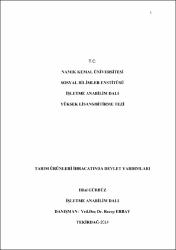| dc.contributor.author | GÜRBÜZ, Hilal | |
| dc.date.accessioned | 2017-05-15T08:08:20Z | |
| dc.date.available | 2017-05-15T08:08:20Z | |
| dc.date.issued | 2014 | |
| dc.identifier.uri | https://hdl.handle.net/20.500.11776/1021 | |
| dc.description.abstract | Kamu aracılığıyla ekonominin belli sektörlerine veya işletmelere sağlanan ayrıcalıklar, avantajlar ve maddi/gayri maddi destekler olarak tanımlanan devlet yardımları olgusunun, rekabet hukuku ve adil bir ticaret sistemi oluşturmak açısından DTÖ ve AB gibi uluslarüstü kuruluşlar tarafından düzenlenmesi ihtiyacı doğmuştur. Bu doğrultuda tarım sektörü için önerilen disiplinler, doğası gereği diğer sektörlerden ayrılmakla birlikte; hedef diğer genel düzenlemelerde olduğu gibi daha liberal bir ticaret sistemi sağlamak olmuştur. DTÖ'de GOÜ sayısının fazlalığı konuya ilişkin alınan kararların bu ülkelerin çıkarları doğrultusunda Şekillenmesi yönünde baskı oluşturmuş ve tarım sektöründe devlet yardımlarının öngörülen bir tarihte kaldırılması nihai hedef olarak ortaya konulmuştur. Uzun yıllardan beri dünya ölçeğinde tarım ürünlerinin ihracatında en büyük müdahaleler AB tarafından gerçekleştirilmiş olup; AB, DTÖ taahhütlerini göz önünde bulundurarak ve rekabet politikasının bir parçası olarak üye ülkelerin kendi ihracatçılarına sağladığı devlet yardımlarında belli sınırlar içinde kalmaları yönünde düzenlemeler yapmıştır. Bu itibarla çalışmanın amacı; Türkiye'nin AB'ye üyelik yolunda ve 1/95 sayılı OKK doğrultusunda tarım ürünleri ihracatındaki düzenlemeleri, AB'nin bu konudaki düzenlemeleri açısından Türkiye'den farklılıkları, DTÖ nezdinde yürütülen ileri tarım müzakereleri ve ticaret açısından tarım sektöründeki serbestleşmenin etkilerini analiz etmeye çalışmaktır. | en_US |
| dc.description.abstract | State aid fact, defined as privileges, advantages and tangible/intangible supports to the certain sectors and enterprises of the economy, is needed to regulate by transnational institutions such as WTO and EU in terms of competition law and the creation of a fair trading system. In this context, in the proposed disciplines for the agricultural sector, even though seceding from other sectors due to its nature, the target has been to provide a more liberal trading system like other general regulations. The average number of developing countries in WTO has caused to pressure in shaping the decisions taken on this issue in line with the interest of these countries and thus, the abolition of state aid in the agricultural sector on a proposed date has been put forward as the ultimate goal. For many years, major interventions in the export of agricultural products have been carried out by EU on a world scale. Regarding to the commitments of WTO and as a part of competition policy, EU has made many arrangements in order to remain member states within a certain limits of state aids in their exports. In this respect, the aim of the study is to analyse arrangements in exports of agricultural products in accordance with the Turkey's EU accession path and ACD No.1/95, differences of Turkey in terms of regulation on this issue by EU, advanced agricultural negotiations carried by WTO, and the effects of liberalization in agricultural sector in terms of trade. | en_US |
| dc.language.iso | tur | en_US |
| dc.publisher | Namık Kemal Üniversitesi | en_US |
| dc.rights | info:eu-repo/semantics/openAccess | en_US |
| dc.subject | tarım ürünleri ihracatı | en_US |
| dc.subject | ihracat iadeleri | en_US |
| dc.subject | devlet yardımları | en_US |
| dc.subject | AB | en_US |
| dc.subject | DTÖ | en_US |
| dc.subject | exports of agricultural products | en_US |
| dc.subject | export refunds | en_US |
| dc.subject | state aid | en_US |
| dc.subject | EU | en_US |
| dc.subject | WTO | en_US |
| dc.title | TARIM ÜRÜNLERİ İHRACATINDA DEVLET YARDIMLARI | en_US |
| dc.type | masterThesis | en_US |
| dc.department | Enstitüler, Sosyal Bilimler Enstitüsü, İşletme Ana Bilim Dalı | en_US |
| dc.relation.publicationcategory | Tez | en_US |



















